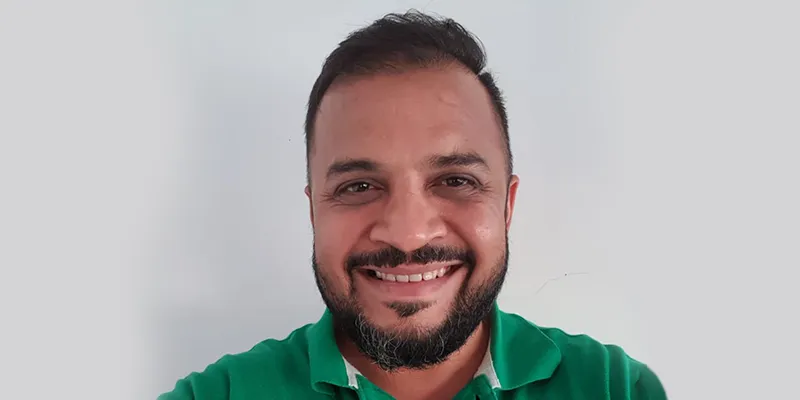This company clocks Rs 40 Cr yearly turnover by recycling factory waste for dunnage
Deluxe Recycling founded by Jignesh Shah is ensuring that more trees are saved by substituting wood with recycled factory waste as dunnage for companies. The B2B company from Mumbai counts Indian Railways among its impressive list of customers.
The world has woken up to the consequences of ignoring warning signs from the environment. And people and businesses are recognising the need to make choices that are ecologically sustainable.
Helping more companies go easy on the planet are companies like Deluxe Recycling, which is a Mumbai-based business that has been providing environment-friendly solutions of dunnage options to various organisations, companies, and industries since 1999.
In a conversation with SMBStory, Jignesh Shah, the founder of the company, shares insights on the Deluxe Recycling’s inception and what it is aiming to accomplish.

Jignesh Shah, Founder of Deluxe Recycling
Working on factory waste
Jignesh Shah hails from a paper manufacturing and recycling background. In 1999, the opportunity to do something about the waste coming from packaging factories changed the course of his life. That is when he started Deluxe Recycling.
The journey spanning almost 20 years began with investments from family, friends, term loans, and cash credit. Today, the company clocks a turnover of about Rs 40 crore per annum and, recently, reported an increase close to 25 percent in the turnover.
He says, “Initially, we used to recycle only the factory waste coming out of the Tetra Pak production lines. Since 2004, we have been supplying these chipboards to the automobile industry in the form of a seatback and backrest for passengers and drivers in the three-wheeler autorickshaw sector.” Jignesh claims that 80 percent of the autorickshaws in the country use chipboards supplied by them.
Deluxe Recycling has a B2B model and is also supporting government bodies by supplying its products to them.
“We supply pallets to Indian Railways that are further used in making bathroom doors. Institutions like Food Corporation of India and the state warehousing corporations of Maharashtra and Chhattisgarh have shown their interest in such applications for recycled products (pallets), which they use for storing food grains in their warehouses,” Jignesh explains, adding that Bajaj Auto Ltd., TVS Motors, and Atul Auto are some of the company’s clients in the automobile sector.
The waste for recycling comes from different regions. About 20-25 percent comes from the leftover waste of the manufacturing units of Tetra Pak. The remaining materials come from collection partners spread across the country. The collected waste or beverage cartons are then sent to the manufacturing unit based out of Palghar in Maharashtra. After the process is completed, Deluxe Recycling supplies the products to different clients with the help of collection partners.
Jignesh says they started with a small plant with a capacity of 75 tonnes per month. It has now expanded to 13,000 metric tonnes per annum.
An eco-friendly solution

The biggest reason why this business model has worked and has found acceptance is because the recycling process at the plants leaves no harmful effects on the environment. The compression moulding technology enables the cartons along with the straws and other waste products to be compressed and recycled, thus leaving no waste behind.
“During the process, 100 percent of the waste product is recycled without any gas emissions or liquid and solid waste discharge from the plant,” Jignesh explains.
Apart from this, the company has also developed technologies to include used beverage cartons (UBC) as part of the waste that can be recycled. At present, the company recycles about 6,000 tonnes per annum of aseptic cartons and UBCs.
But it has not always been easy. Jignesh notes that in the initial years convincing consumers to accept the product was a big challenge. The company found it difficult to break through some preconceived notions people had about recycled products.
“It took quite some time to get the customer to accept that recycled products are equally good and can replace wood and plywood,” he says.
The challenge to make more customer-oriented products remains till today, according to Jignesh. However, it is a win-win for the environment as well as the market. He says, “The unique part is, we are taking away the waste products from the landfills and other sources and are creating useful and valuable products out of that waste.”
This way, wood can be replaced leading to reduced deforestation.
Even though Jignesh claims to not have any direct competitor, the company does compete with “plywood and wood-based panel manufacturing companies, which itself in India, is a Rs 2,000 crore market annually.”
Future plans
Jignesh has big plans to execute in the coming days.
“Currently, we are recycling close to 12,000 tonnes per annum of material including Tetra Pak cartons and other waste products. Our target in next three-five years is to reach 30,000 tonnes per annum,” he says.
Deluxe is also planning to create a collection network for the post-consumer market. Additionally, diversification is also on the cards, as the company is looking to recycle plastic products.
(Edited by Evelyn Ratnakumar)






1552653967435.png?mode=crop&crop=faces&ar=1%3A1&format=auto&w=1920&q=75)


